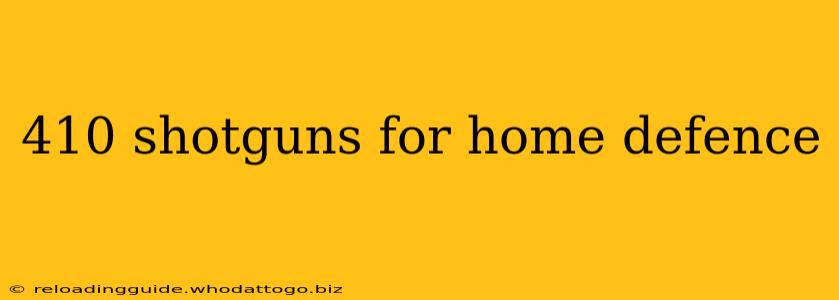Choosing a firearm for home defense is a serious decision, demanding careful consideration of various factors. While the 12-gauge shotgun often dominates the conversation, the .410 bore shotgun presents a compelling, albeit often overlooked, alternative. This guide delves into the pros and cons of using a .410 shotgun for home defense, helping you make an informed choice based on your specific needs and circumstances.
The .410 Bore: A Closer Look
The .410 bore, often mistakenly referred to as a ".410 gauge," is the smallest commonly available shotgun gauge. Its smaller diameter leads to several key characteristics that distinguish it from its larger counterparts:
-
Reduced Recoil: This is arguably the .410's biggest advantage for home defense. The lower recoil makes it easier to handle, especially for smaller or less experienced shooters. This translates to faster follow-up shots and improved accuracy under stress.
-
Quieter Operation: The smaller shot charge produces a less intense report, which can be beneficial in close-quarters environments where excessive noise could compromise hearing or alert neighbors unnecessarily.
-
Compact Size: Many .410 shotguns are designed to be compact and lightweight, making them easy to maneuver in tight spaces and store conveniently.
-
Ammunition Variety: While not as extensive as 12-gauge options, .410 ammunition comes in various forms, including birdshot, buckshot, and slugs, allowing some degree of customization for home defense purposes.
Advantages of a .410 for Home Defense
-
Ease of Use: The manageable recoil makes the .410 an excellent choice for individuals with limited upper body strength or those new to firearms.
-
Reduced Risk of Overpenetration: Compared to larger gauges, the .410's smaller shot size generally reduces the risk of the projectiles penetrating walls and injuring unintended targets. This is crucial in densely populated areas or homes with thin walls. However, it is important to understand that even .410 buckshot can penetrate, so responsible shot placement remains paramount.
-
Maneuverability: Compact .410 shotguns are ideal for navigating confined spaces within a home.
Disadvantages of a .410 for Home Defense
-
Stopping Power: This is the most frequently cited drawback. The smaller shot charge of a .410, especially with birdshot, may not provide the same stopping power as a 12-gauge. While buckshot offers improved stopping power, it's still less potent than 12-gauge buckshot.
-
Limited Ammunition Capacity: Many .410 shotguns have smaller magazine capacities compared to 12-gauge counterparts, meaning fewer shots before reloading.
-
Accuracy Considerations: The smaller shot spread can make precise shots at longer ranges more challenging. Effective home defense scenarios often involve close-range engagements, mitigating this concern to some degree.
Choosing the Right .410 Shotgun for Home Defense
If you are considering a .410 for home defense, prioritize these features:
-
Reliable Action: Choose a shotgun with a proven track record of reliability.
-
Appropriate Ammunition: Select ammunition specifically designed for self-defense purposes, such as 000 buckshot.
-
Easy-to-Use Controls: Simple and intuitive safety mechanisms and controls are crucial in high-stress situations.
-
Proper Training: Regardless of the firearm chosen, comprehensive training is absolutely essential for safe and effective home defense.
Conclusion
The .410 shotgun can be a viable option for home defense, especially for individuals who prioritize reduced recoil and ease of handling. However, its reduced stopping power compared to larger gauges must be carefully considered. Thoroughly weigh the pros and cons, understand your limitations, and prioritize proper training before making a decision. Remember, responsible firearm ownership and safe handling practices are paramount. This information is for educational purposes only and should not be considered professional advice. Always consult with qualified firearms instructors and legal professionals before making any decisions regarding firearms ownership and self-defense.

